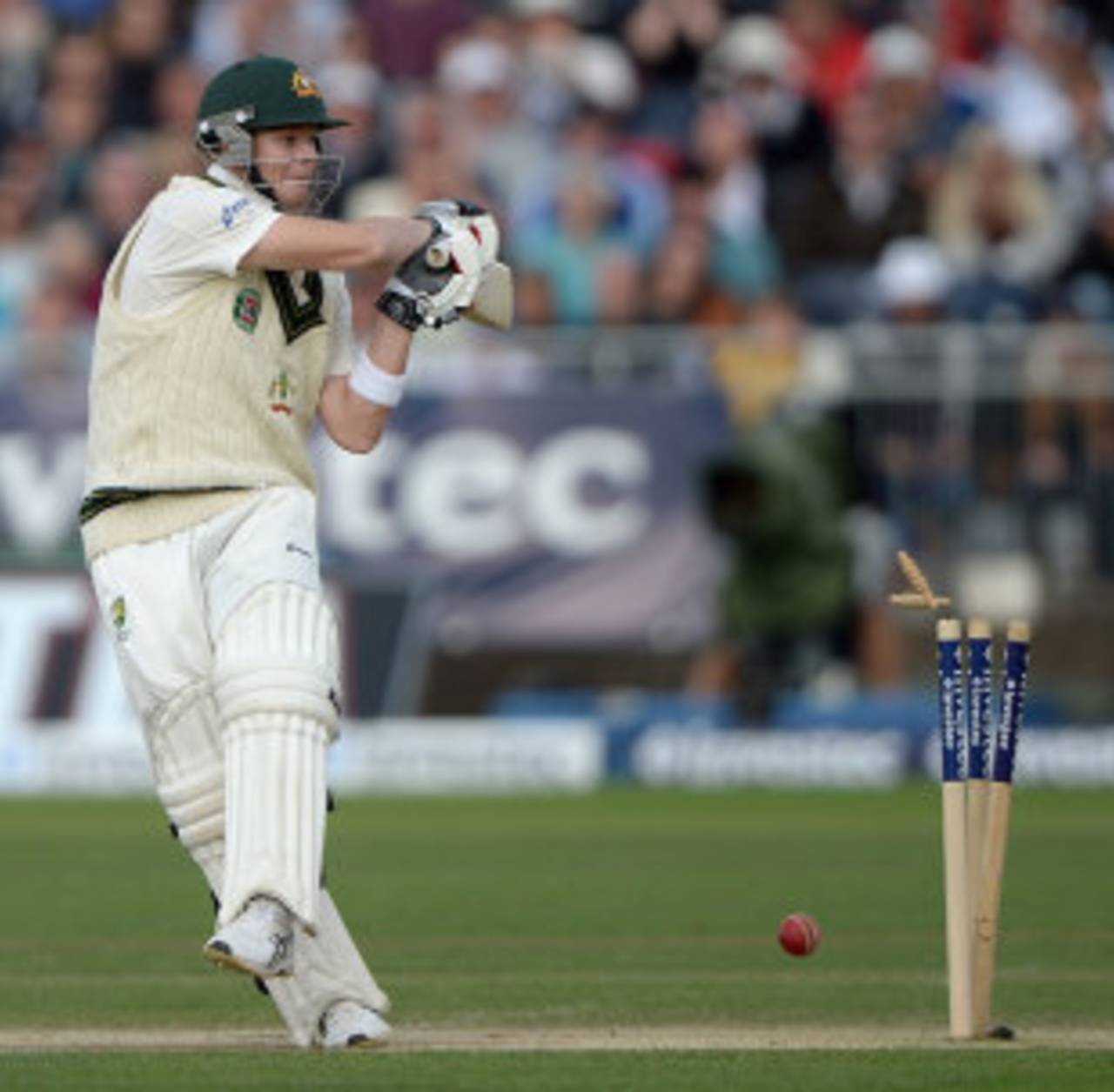LLLLLLDL.
That's not the name of an obscure Welsh town, that's Australia's
record in Tests since the start of this year's tour of India. Stretch it back to the start of the Australian summer and it's a little healthier, but not much:
DDLWWWLLLLLLDL. The victories were all against Sri Lanka, a team that has never won a Test in Australian conditions. Australia were on top in all three draws, against South Africa and England. Some losses have been comprehensive, others close.
Australia seem to have forgotten how to handle the pressure moments, the tight contests. Perhaps it is not so much that they have forgotten but that they've never known, for besides
Michael Clarke, none of this current outfit have ever really known extended Test success. The coach,
Darren Lehmann, played in 27 Tests and
only five weren't wins. Compare that to a man like
Steven Smith, who has played in only two victories, both early in his career, from 11 Tests.
Winning is a habit. Get a few successes on the board, especially against quality opponents, and especially in close finishes, and you start to trust that it can be done. Shane Warne often talks about believing it is possible to win from anywhere; Clarke's men appear petrified that they can lose from anywhere. How else to explain their collapse after tea at Chester-le-Street? Few of their recent losses will hurt like this one, because they know - they know - they should have won it.
The target of 299 was a challenge, certainly, but
Chris Rogers and
David Warner made Australia's highest opening stand in a Test chase in 18 years, reaching 109 for 0. Even after Rogers fell, Australia were still comfortable at tea, at 120 for 1. Then the doubt crept in. The fear. The knowledge that this match was there to lose, a 2-1 scoreline was theirs to give up. And dutifully, they handed England the momentum, their wickets and a series win.
At 5.26pm
Usman Khawaja departed, Warner at 5.44, Clarke at 6.10, Smith at 6.22,
Shane Watson at 6.29,
Brad Haddin at 6.39. Then the bowlers tumbled too, but it wasn't their fault. In the final session Australia lost nine for 104. England's bowling improved -
Stuart Broad and
Tim Bresnan bowled in tandem, keeping things tight, bringing the batsmen on to the front foot instead of offering up the short-of-a-length stuff they had delivered before tea. But they weren't nine-wickets-in-a-session good.
That Australia collapsed again is almost not a story, for it has happened so often in recent years that it is the norm. But to collapse when the openers had laid such a strong foundation is almost more galling. And how many of the batsmen could say they were done by great balls? Clarke missed a super delivery from Broad that angled in and nipped away just enough, but Watson and Haddin essentially just missed straight deliveries.
They were the two senior men in the lower middle-order. They had to show more resolve, respect the good balls and wait for the bad ones. Rogers had given them the template. Smith tried to do that, go after a short ball, but wasn't good enough to middle it and played on instead. Khawaja was typically elegant, but elegant doesn't win Test matches in tight situations. Fight does. Hunger does. Sheer bloody-mindedness does.
It raised the question - again - of whether Australia's batsmen are good enough for Test cricket. It goes without saying that Clarke is, and Rogers has shown in this series that he has the necessary technique and determination. Warner played a mature innings here but too often is careless. Watson is the No.6 and allrounder because there is nobody better. Smith and Khawaja have both shown signs of being Test batsmen but inspire little confidence in tight spots.
For all of them, this was an opportunity. This was a chance to stand up in a challenging situation, to deliver a victory for their struggling team. Rogers and Warner did the hard work early. Nobody matched them. It leaves the selectors in a difficult position, for they cannot keep picking men who fail under pressure. Phillip Hughes and Matthew Wade could be considered for The Oval Test, but where are the other batsmen applying the pressure?
"I think we are picking the best players," Clarke said after the loss. "Everyone says rebuild, rebuild, rebuild, but you need guys in first-class cricket making runs to take someone's slot. We have to continue to show faith in these guys - it takes time playing against good opposition. We just played South Africa in Australia, we are playing England here then England in Australia, then we go to South Africa - we are playing the best oppositions in the world. I think the selectors are doing the best they can to pick the best sides."
Clarke has had plenty of practice answering difficult questions after losses, but in the post-match press conference he looked drained of all his spark. He paid credit to Broad for his fine bowling, claimed responsibility for his own dismissal and not leading by example, and tried his best to back his men. Ultimately, though, his mood could be summed up by one answer: "It's extremely disappointing - I guess I know now what it feels like to lose an Ashes series as a captain."
Losing matches, losing series - it's all becoming far too familiar a feeling. When he retired after the series win over Sri Lanka during the home summer, Michael Hussey handed custodianship of the team victory song to
Nathan Lyon. That was seven months ago. Eight Tests ago. Lyon is yet to lead the beer-soaked choir.
Under the Southern Cross I stand, a sprig of wattle in my hand.
The words are easy to remember, how to win a Test match not so much.
Brydon Coverdale is an assistant editor at ESPNcricinfo. He tweets here
